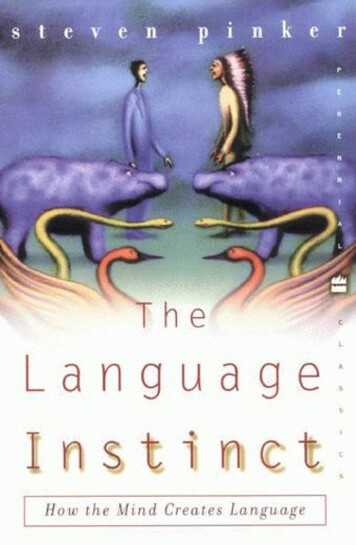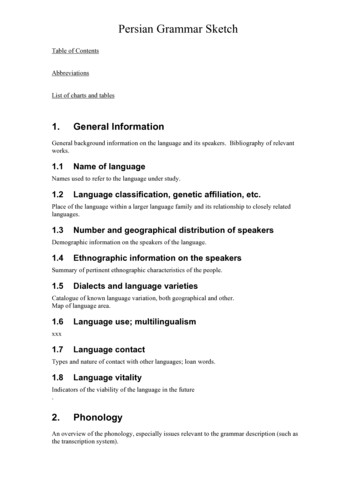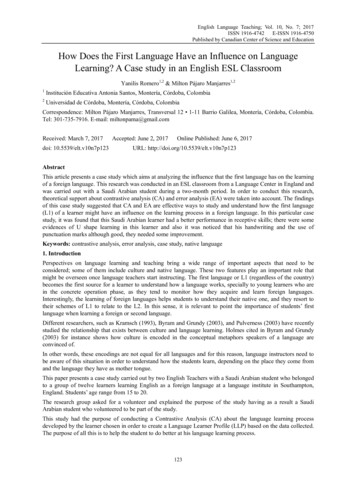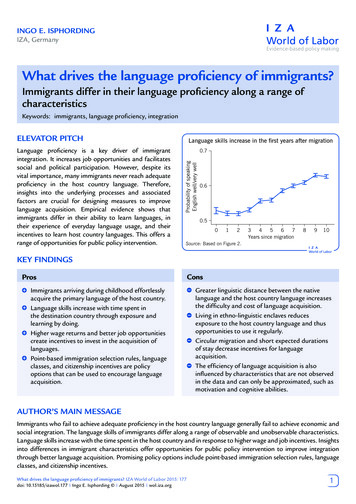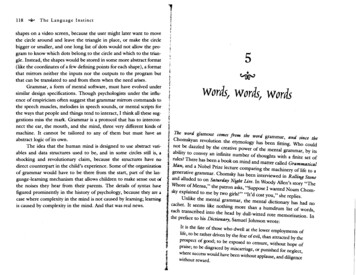
Transcription
.,118 i\The Language Instinctshapes on a video screen, because the user might later want to movethe circle around and leave the triangle in place, or make the circlebigger or smaller, and one long list of dots would not allow the pro gram to know which dots belong to the circle and which to the trian gle. Instead, the shapes would be stored in some more abstract format(like the coordinates of a few defining points for each shape), a formatthat mirrors neither the inputs nor the outputs to the program butthat can be translated to and from them when the need arises.Grammar, a form of mental software, must have evolved undersimilar design specifications. Though psychologists under the influ ence of empiricism often suggest that grammar mirrors commands tothe speech muscles, melodies in speech sounds, or mental scripts forthe ways that people and things tend to interact, I think all these sug gestions miss the mark. Grammar is a protocol that has to intercon nect the ear, the mouth, and the mind, three very different kiIids ofmachine. It cannot be tailored to any of them but must have anabstract logic of its own.The idea that the human mind is designed to use abstract vari ables and data structures used to be, and in some circles still is, ashocking and revolutionary claim, because the structures have nodirect counterpart in the child's experience. Some of the organizationof grammar would have to be there from the start, part of the lan guage-learning mechanism that allows children to make sense out oithe noises they hear from their parents. The details of syntax havefigured prominently in the history of psychology, because they are acase where complexity in the mind is not caused by learning; learningis caused by complexity in the mind. And that was real news.t5;j,If. ! words, words, words' fti, The word glamour comes from the word grammar, and since the! Chornskyan revolution the etymology has been fitting. Who couldnot be dazzled by the creative power of the mental grammar, by itsability to convey an infinite number of thoughts with a finite set ofrules? There has been a book on mind and matter called GrammaticalMan, and a Nobel Prize lecture comparing the machinery of life to agenerative grammar. Chomsky has been interviewed in Rolling Stoneand alluded to on Saturday Night Live. In Woody Allen's story "TheWhore of Mensa," the patron asks, "Suppose I wanted Noam Chom sky explained to me by two girls?" "It'd cost you," she replies.Unlike the mental grammar, the mental dictionary has had nocachet. It seems like nothing more than a humdrum list of words,each transcribed into the head by dull-witted rote memorization. Inthe preface to his Dictionary, Samuel Johnson wrote:f'Ji 1It is the fate of those who dwell at the lower employments oflife, to be rather driven by the fear ofevil, than attracted by theprospect of good; to be exposed to censure, without hope ofpraise; to be disgraced by miscarriage, or punished for neglect,where success would have been without applause, and diligencewithout reward.
.,120"'*"The Language InstinctWords, Words, WordsAmong these unhappy mortals is the writer of diction -a-:aries.;.121A subject agreement marker. It identifies the eater asfalling into Class 1 of the sixteen gender classes, "humanJohnson's own dictionary defines lexicographer as "a harmless drudge,singular." (Remember that to a linguist "gender" meansthat busies himself in tracing the original, and detailing the significa kind, not sex.) Other genders embrace nouns that pertain totion of words."several humans, thin or extended objects, objects that comeIn this chapter we will see that the stereotype is unfair. The worldin pairs or clusters, the pairs or clusters themselves, instru of words is just as wondrous as the world of syntax, or even more so.ments, animals, body parts, diminutives (small or cute ver For not only are people as infinitely creative with words as they aresions of things), abstract qualities, precise locations, andwith phrases and sentences, but memorizing individual wordsgeneral locales.demands its own special virtuosity. -i'-: Present tense. Other tenses in Bantu can refer to today,Recall the wug-test, passed by any preschooler: "Here is a wug.earlier today, yesterday, no earlier than yesterday, yesterdayNow there are two of them. There are two ." Before being so chal or earlier, in the remote past, habitually, ongoing, consecu lenged, the child has neither heard anyone say, nor been rewarded fortively, hypothetically, in the future, at an indeterminate time,saying, the word wugs. Therefore words are not simply retrieved fromnot yet, and sometimes.a mental archive. People must have a mental rule for generating new -ki-: An object agreement marker, in this case indicating thatwords from old ones, something like "To form the plural of a noun,the thing eaten falls into gender Class 7.add the suffix -s." The engineering trick behind human language-its -m-: A benefactive marker, indicating for whose benefitbeing a discrete combinatorial system-is used in at least two differentthe action is taking place, in this case a member of genderplaces: sentences and phrases are built out of words by the rules ofClass I.syntax, and the words themselves are built out of smaller bits by -Iyi-: The verb, "to eat."another set of rules, the rules of "morphology." -Y-: An "applicative" marker, indicating that the verb's castThe creative powers of English morphology are pathetic com of players has been augmented by one additional role, in thispared to what we find in other languages. The English noun comes incasethe benefactive. (As an analogy, imagine that in Englishexactly two forms (duck and ducks), the verb in four (quack, quacks,we had to add a suffix to the verb bake when it is used in Iquacked, quacking). In modern Italian and Spanish every verb hasbaked her a cake as opposed to the usual 1 baked a cake.)about fifty forms; in classical Greek, three hundred and fifty; in Turk ish, two million! Many of the languages I have brought up, such as -a: A final vowel, which can indicate indicative versus sub junctive mood.Eskimo, Apache, Hopi, Kivunjo, and American Sign Language, areknown for this prodigious ability. How do they do it? Here is anIf you multiply out the number of possible combinations of the sevenexample from Kivunjo, the Bantu language that was said to makeEnglish look like checkers compared to chess. The verb "Nalki ! prefixes and suffixes, the product is about half a million, and that ismlyii'a," meaning "He is eating it for her," is composed of eight parts: , the number of possible forms per verb in the language. In effect,; Kivunjo and languages like it are building an entire sentence inside a N-: A marker indicating that the word is the "focus" of that; single complex word, the verb.point in the conversation.But I have been a bit unfair to English. English is genuinely\i
1 ,t122t4-'tThe Language Instinctcrude in its "inflectional" morphology, where one modifies a word tofit the sentence, like marking a noun for the plural with -s or a verbfor past tense with oed. But English holds its own in "derivational"morphology, where one creates a new word out of an old one. Forexample, the suffix -able, as in learnable, teachable, and hUll!Jable, con verts a verb meaning "to do X" into an adjective meaning "capableof having X done to it." Most people are surprised to learn how manyderivational suffixes there are in English. Here are the more -ness-ory-ous-yWords, Words, Wordst4- 123number of possible words in a language bigger than immense; likethe number of sentences, it is infinite. Putting aside fanciful coinages.' concocted for immortality in Guinness, a candidate for the longestJ word to date in English might be jloccinaucinihiiipilijication, defined in the Oxford English Dictionary as "the categorizing of something asworthless or trivial." But that is a record meant to be broken:jloccinaucinihilipitijicational: pertaining to the categorizing ofsomething as worthless or trivialjloccinaucinihilipilijicationalize: to cause something to pertainto the categorizing of something as worthless or trivialjloccinaucinihilipilijicationalization: the act of causing some thing to pertain to the categorizing of something as worth less or trivialjloccinaucinihilipilijicationalizational: pertaining to the act ofcausing something to pertain to the categorizing of some thing as worthless or trivial.th "di g" whichjloccinaucinihi/ipi/ijicationalizationalize: to cause somethingI n addi'tlon, English is free andeasy Wicompounn ,. to the act of causing something to pertain .Colike toothbrushandto pertamglues twO words together to iorm a new o n e , .mouse-eater. Thanks to these processes, the number of pOSSible words,Or, if you suffer from sesquipedaliaphobia, you can think of youreven in morphologically impoverished English, is im.m nse. The com- ,great-grandmother, your great-great-grandmother, your great-great putationallinguist Richard Sproat compiled all the disnnct words used great-grandmother, and so on, limited only in practice by the numberin the forty-four million words of text from Associated Press news of generations since Eve.stories beginning in mid-February 1988. Up through December 30,What's more, words, like sentences, are too delicately layered tothe list contained three hundred thousand distinct word forms, abo t be generated by a chaining device (a system that selects an item fromas many as in a good unabridged dictionary. You might gu ss that this one list, then moves on to some other list, then to another). Whenwould exhaust the English words at would ever appe.ar 10 such sto- Ronald Reagan proposed the Strategic Defense Initiative, popularlyries. But when Sproat looked at what came over the wrre o Dece.m. i known as Star Wars, he imagined a future in which an incoming Sovietber 31, he found no fewer than thirty-five new forms, cluding 'missile would be shot down by an anti-missile missile. But criticsinstrumenting, counterprograms, armhole, part-Vulcan, !uzz,er, grov- pointed out that the Soviet Union could counterattack with an anti eled, boulderlike, mega-lizard, traumatological, and ex-cr, ers.anti-missile-missile missile. No problem, said his MIT-educated engiEven more impressive, the output of one morpholOgical rule .can neers; we'll just build an anti-anti-anti-missile-missile-missiie missile.be the input to another, or to itself: one can talk about the unmlCro- These high-tech weapons need a high-tech grammar-something thatwaveability of some French fries or a toothbrush-holder ,fastener box can keep track of all the anti's at the beginning of the word so that itin which to keep one's toothbrush-holder fasteners. This makes the can complete the word with an equal number of missile's, plus one, at-1C
124 The Language InstinctWords, Words, Wordsthe end. A word structure grammar (a phrase structure grammar forwords) that can embed a word in between an anti- and its missikcan achieve these objectives; a chaining device cannot, because it iusforgonen the pieces that it laid down at the beginning of the longword by the time it gets to the end.This rule is the simplest, most stripped-down example of any thing we would want to call a rule of grammar. In my laboratory weuse it as an easily studied instance of mental grammar, allowing us todocument in great detail the psychology of linguistic rules frominfancy to old age in both normal and neurologically impaired people,in much the same way that biologists focus on the fruit fly Drosophilato study the machinery of genes. Though simple, the rule that gluesan inflection to a stem is a surprisingly powerful computational opera tion. That is because it recognizes an abstract mental symbol, like"noun stem," instead of being associated with a particular list ofwords or a particular list of sounds or a particular list of meanings. Wecan use the rule to inflect any item in the mental dictionary that lists"noun stem" in its entry, without caring what the word means; wecan convert not only dog to dogs but also hour to hours and justificationto justifications. Likewise, the rule allows us to form plurals withoutcaring what the word sounds like; we pluralize unusual-soundingwords as in the Gorbachevs, the Bachs, and the Mao Zedongs. For thesame reason, the rule is perfectly happy applying to brand-new nouns,like faxes, dweebs, wugs, and zots.N Idog125The rule nicely interfaces with the mental dictionary: dog would belisted as a noun stem meaning "dog," and -swould be listed as a nouninflection meaning "plural of."Like syntax, morphology is a cleverly designed system, and many 01the seeming oddities of words are predictable products of its internallogic. Words have a delicate anatomy consisting of pieces, called mor phemes, that fit together in certain ways. The word structure systemis an extension of the X-bar phase structure system, in which big noun·ish things are built out of smaller nounish things, smaller noWlishthings are built out of still smaller nounish things, and so on. 1bcbiggest phrase involving nouns is the noun phrase; a noun phrase CQQ tains an N-bar; an N-bar contains a noun-the word. Jumping fromsyntax to morphology, we simply continue the dissection, analyzinsthe word into smaller and smaller nounish pieces.Here is a picture of the structure of the word dogs:Nstem NinflectionIWe apply the rule so effortlessly that perhaps the only way I candrum up some admiration for what it accomplishes is to comparehumans with a certain kind ofcomputer program that many computerscientists tout as the wave of the future. These programs, called "arti ficial neural networks," do not apply a rule like the one I have justshown you. An artificial neural network works by analogy, convertingwug to wugged because it is vaguely similar to hug-hugged, walk walked, and thousands of other verbs the network has been trained torecognize. But when the network is faced with a new verb that isunlike anything it has previously been trained on, it often mangles it,because the network does not have an abstract, all-embracing category"verb stem" to fall back on and add an affix to. Here are some com -sThe top of this mini-tree is "N" for "noun"; this allows the dockingmaneuver in which the whole word can be plugged into the noun sloeinside any noun phrase. Down inside the word, we have two pans:the bare word form dog, usually called the tem, and the plural inflec·tion ·s. The rule responsible for inflected words (the rule of wug-tatfame) is simplyN - Nstem Ninflection"A noun can consist of a noun stem followed by a noun inflec tion."i. ,-
126.Words, Words, WordsThe Language Instinctparisons between what people typically do and what artificial neuralnetworks typically do when given a wug-test:TYPICAL PAST-TENSE FObGIVEN BY NEURALTYPICAL PAST-TENSE FORMVERBGIVEN BY agfreezledwink .quiversatisfysmairftrilbsmeejfrilgStems can be built out of parts, too, in a second, deeper lC\'dof word assembly. In compounds like Yugoslavia report, sushi-Jqpg, .broccoli-green, and toothbrush,NstemNstemIIYugoslaviareporttwo stems are joined together to form a new stem, by the ruleNstem - Nstem Nstem"A noun stem can consist of a noun stem followed by anothernoun stem."In English, a compound is often spelled with a hyphen or by runn.UlIits twO words together, but it can also be spelled with a space berwcothe two components as if they were still separate words. This coIlfudyour grammar teacher into telling you that in Yugoslavia rtplll'l,"Yugoslavia" is an adjective. To see that this can't be right, just C!comparing it with a real adjective like interesting. You can say n.report seems interesting but not This report seems Yugoslavia! TheK 127a simple way to tell whether something is a compound word or aphrase: compounds generally have stress on the first word, phrases onthe second. A dark room (phrase) is any room that is dark, but a darkroom (compound word) is where photographers work, and a dark room can be lit when the photographer is done. A black board(phrase) is necessarily a board that is black, but some blackboards(compound word) are green or even white. Without pronunciation orpunctuation as a guide, some word strings can be read either as aphrase or as a compound, like the following headlines:Squad Helps Dog Bite VictimMan Eating Piranha Mistakenly Sold as Pet FishJuvenile Court to Try Shooting DefendantNew stems can also be formed out of old ones by adding affixes(prefixes and suffixes), like the -ai, -ize, and -ation I used recursivelyto get longer and longer words ad infinitum (as in sensationalizatio nalization). For example, -able combines with any verb to create anadjective, as in crunch-crunchable. The suffix -er converts any verb toa noun, as in crunch-cruncher, and the suffix -ness converts any adjec tive into a noun, as in cruncbJcrunchiness. Nstem.Astern VstemAsternaffixIcrunchI.ableThe rule forming them isAstern - Stem Astemaffix"An adjective stem can consist of a stem joined to a suffix."and a suffix like -able would have a mental dictionary entry likethe following:-able:adjective stem affixmeans "capable of being X'd"attach me to a verb stem
,.128 Words, Words, WordsThe Language InstinctLike inflections, stem affixes are promiscuous, mating with any stemthat has the right category label, and so we have crunchable, scrunch able, shmooshable, wuggable, and so on. Their meanings are predict able: capable of being crunched, capable of being scrunched, capableof being shmooshed, even capable of being "wugged," whatever wugmeans. (Though I can think of an exception: in the sentence I askedhim what he thought of my review in his book, and his response wasunprintable, the word unprintable means something much more spe cific than "incapable of being printed.")The scheme for computing the meaning of a stem out of themeaning of its parts is similar to the one used in syntax: one specialelement is the "head," and it determines what the conglomerationrefers to. Just as the phrase the cat in the hat is a kind of cat, showingthat cat is its head, a Yugoslavia report is a kind of report, and shmoosh ability is a kind of ability, so report and -ability must be the heads ofthose words. The head of an English word is simply its rightmostmorpheme.Continuing the dissection we can tease stems into even smaller parts.The smallest part of a word, the part that cannot be cut up into anysmaller parts, is called its root. Roots can combine with special suffixesto form stems. For example, the root Darwin can be found inside thestem Darwinian. The stem Darwinian in turn can be fed into thesuffixing rule to yield the new stem Darwinianism. From there, theinflectional rule could even give us the word Darwinianisms, embody ing all three levels of word structure:N NstemNinflection INstemNstemaffix-s NrootIDarwinNrootaffixI-ianI-ism 129Interestingly, the pieces fit together in only certain ways. Thus Dar winism, a stem formed by the stern suffix -ism, cannot be a host for-ian, because -ian attaches only to roots; hence Darwinismian (whichwould mean "pertaining to Darwinism") sounds ridiculous. Similarly,Darwinsian ("pertaining to the two famous Darwins, Charles andErasmus"), Darwinsianism, and Darwinsism are quite impossible,because whole inflected words cannot have any root or stern suffixesjoined to them.Down at the bottommost level of roots and root affixes, we haveentered a strange world. Take electricity. It seems to contain two parts,electric and -ity:Nstem NrootNrootsuffixIelectricI-ityBut are these words really assembled by a rule, gluing a dictionaryentry for -ity onto the root electric, like this?Nstem -- Nroot Nrootsuffix"A noun stem can be composed ofa noun root and a suffix."-ity:noun root suffixmeans "the state of being X"attach me to a noun rootNot this time. First, you can't get electricity simply by gluingtogether the word electric and the suffix -ity--that would sound like"electrick itty." The root that -ity is attached to has changed its pro nunciation to "electrIss." That residue, left behind when the suffixhas been removed, is a root that cannot be pronounced in isolation.Second, root-affix combinations have unpredictable meanings;the neat scheme for interpreting the meaning of the whole from themeaning of the parts breaks down. Complexity is the state of beingcomplex, but electricity is not the state of being electric (you would
130 The Language Instinctnever say that the electricity of this new can opener makes it conve nient); it is the force powering something electric. Similarly, instru mental has nothing to do with instruments, intoxicate is not abouttoxic substances, one does not recite at a recital, and a five-speedtransmission is not an act of transmitting.Third, the supposed rule and affix do not apply to words freely,unlike the other rules and affixes we have looked at. For example,something can be academic or acrobatic or aerodynamic or alcoholic,but academicity, acrobaticity, aerodynamicity, and alcoholicity soundhorrible (to pick just the first four words ending in -ic in my electronicdictionary).So at the third and most microscopic level of word structure,roots and their affixes, we do not find bona fide rules that build wordsaccording to predictable formulas, wug-style. The stems seem to bestored in the mental dictionary with their own idiosyncratic meaningsattached. Many of these complex stems originally were formed afterthe Renaissance, when scholars imported many words and suffixesinto English from Latin and French, using some of the rules appro priate to those languages of learning. We have inherited the words,but not the rules. The reason to think that modern English speakersmentally analyze these words as trees at all, rather than as homoge neous strings of sound, is that we all sense that there is a natural breakpoint between the electric and the -ity. We also recognize that there isan affinity between the word electric and the word electricity, and werecognize that any other word containing -ity must be a noun.Our ability to appreciate a pattern inside a word, while knowingthat the pattern is not the product of some potent rule, is the inspira tion for a whole genre of wordplay. Self-conscious writers and speak ers often extend Latinate root suffixes to new forms by analogy, suchas religiosity, criticality, systematicity, randomicity, insipidify, calumni ate, conciliate, stereotypy, disaffiliate, gallonage, and Shavian. Thewords have an air of heaviosity and seriosity about them, making thestyle an easy target for parody. A 1982 editorial cartoon by Jeff Mac Nelly put the following resignation speech into the mouth of Alexan der Haig, the malaprop-prone Secretary of State:Words, Words, Words.131I decisioned the necessifaction of the resignatory action/option due to the dangerosity of the trendflowing of foreignpolicy away from our originatious careful coursing towardsconsistensivity, purposity, steadfastnitude, and above all,clarity.Another cartoon, by Tom Toles, showed a bearded academicianexplaining the reason verbal Scholastic Aptitude Test scores were atan all-time low:Incomplete implementation of strategized programmatics des ignated to maximize acquisition of awareness and utilizationof communications skills pursuant to standardized review andassessment oflanguaginal development.In the culture of computer programmers and managers, thisanalogy-making is used for playful precision, not pomposity. The NewHacker's Dictionary, a compilation of hackish jargon, is a near exhaustive catalogue of the not-quite-freely-extendible root affixes inEnglish:ambimoustrous adj. Capable of operating a mouse with eitherhand.barjulous adj. Something that would make anyone barf.bogosity n. The degree to which something is bogus.bogotify v. To render something bogus.bozotic adj. Having the quality of Bozo the Clown.cuspy adj. Functionally elegant.depeditate v. To cut the feet off of (e.g., while printing thebottom ofa page).dimwittery n. Example of a dim-witted statement.geekdom n. State of being a techno-nerd.marketroid n. Member ofa company's marketing department.mumblage n. The topic ofone's mumbling.pessimal adj. Opposite of "optimal."wedgitude n. The state of being wedged (stuck; incapable ofproceeding without help).wizardly adj. Pertaining to expert programmers.
Words, Words, Words132 4- 4- 133The Language InstinctDown at the level ofword roots, we also find messy patterns in irregu lar plurals like mouse-mice and man-men and in irregular past-tenseforms like drink-drank and seek-sought. Irregular forms tend to comein families, like drink-drank, sink-sank, shrink-shrank, stink-stank,sing-sang, ring-rang, spring-sprang, swim-swam, and sit-sat, or blow blew, know-knew,grow-grew, throw-threw,jly-flew, and slay--slew. 'Thisis because thousands ofyears ago Proto-Indo-European, the languageancestral to English and most other European languages, had rulesthat replaced one vowel with another to form the past tense, just aswe now have a rule that adds -ed. The irregular or "strong" verbs inmodern English are mere fossils of these rules; the rules themselvesare dead and gone. Most verbs that would seem eligible to belong tothe irregular families are arbitrarily excluded, as we see in the follow ing doggerel:Sally Salter, she was a young teacher who taught,And her friend, Charley Church, was a preacher who praught;Though his enemies called him a screecher, who scraught.His heart, when he saw her, kept sinking, and sunk;And his eye, meeting hers, began winking, and wunk;While she in her turn, fell to thinking, and thunk.In secret he wanted to speak, and he spoke,To seek with his lips what his heart long had soke,So he managed to let the truth leak, and it loke.The kiss he was dying to steal, then he stole;At the feet where he wanted to kneel, then he knole;And he said, "I feel better than ever I fole."People must simply be memorizing each past-tense form sepa rately. But as this poem shows, they can be sensitive to the patternsamong them and can even extend the patterns to new words forhumorous effect, as in Haigspeak and hackspeak. Many of us havebeen tempted by the cuteness of sneeu-snOU, squeeu-squou, take took-tooken, and shit-shat, which are based on analogies with freeze froze, break-broke-broken, and sit-sat. In Crazy English RichardLederer wrote an essay called "Foxen in the Henhice," featuringirregular plurals gone mad: booth-beeth, harmonica-harmonicae,mother-methren, drum-dra, Kleenex-Kleenices, and bathtub-bath tubim. Hackers speak of!axen, VAXen, boxen, meece, and Macinteesh.Newsweek magazine once referred to the white-caped, rhinestone studded Las Vegas entertainers as Elvii. In the Peanuts comic strip,Linus's teacher Miss Othmar once had the class glue eggshells intomodel igii. Maggie Sullivan wrote an article in the New York Timescalling for "strengthening" the English language by conjugatingmore verbs as if they were strong:Subdue, subdid, subdone: Nothing could have subdone him theway her violet eyes subdid him.Seesaw, sawsaw, seensaw: While the children sawsaw, the oldman thought oflong ago when he had seensaw.Pay, pew, pain: He had pain for not choosing a wife more care fully.Ensnare, ensnore, ensnorn: In the 60's and 70's, Sominex adsensnore many who had never been ensnorn by ads before.Commemoreat, commemorate, commemoreaten: At the banquetto commemoreat Herbert Hoover, spirits were high, and bythe end of the evening many other Republicans had beencommemoreaten.In Boston there is an old joke about a woman who landed atLogan Airport and asked the taxi driver, "Can you take me someplacewhere I can get scrod?" He replied, "Gee, that's the first time I'veheard it in the pluperfect subjunctive."Occasionally a playful or cool-sounding form will catch on andspread through the language community, as catch-caught did severalhundred years ago on the analogy of teach-taught and as sneak-snuckis doing today on the analogy of stick-stuck. (I am told that has tookenis the preferred form among today's mall rats.) This process can be. seen clearly when we compare dialects, which retain the products oftheir own earlier fads. The curmudgeonly columist H. L. Menckenwas also a respectable amateur linguist, and he documented many
134"""'"The Language Instinctpast-tense forms found in American regional dialects, like heat-ha(similar to bleed-bled), drag-drug (dig-dug), and help-holp (tell-told).Dizzy Dean, the St. Louis Cardinals pitcher and CBS announcer, wasnotorious tor saying "He slood into second base," common in hisnative Arkansas. For four decades English teachers across the nationengaged in a letter-writing campaign to CBS demanding that he beremoved, much to his delight. One of his replies, during the GreatDepression, was "A lot of folks that ain't sayin' 'ain't' ain't eatin'."Once he baited them with the following play-by-play:The pitcher wound up and lang the ball at the batter. Thebatter swang and missed. The pitcher lang the ball again andthis time the batter connected. He hit a high fly right to thecenter fielder. The center fielder was all set to catch the ball,but at the last minute his eyes were blound by the sun and hedropped it!But successful adoptions of such creative extensions are rare; irregularsremain mostly as isolated oddballs.Irregularity in grammar seems like the epitome of human eccentricityand quirkiness. Irregular forms are explicitly abolished in "rationallydesigned" languages like Esperanto, Orwell's Newspeak, and Plane tary League Auxiliary Speech in Robert Heinlein's science fictionnovel Time for the Stars. Perhaps in defiance of such regimentat
, The word glamour comes from the word grammar, and since the . gestions miss the mark. Grammar is a protocol that has to intercon nect the ear, the mouth, and the mind, three very diffe
